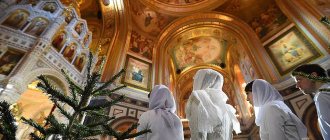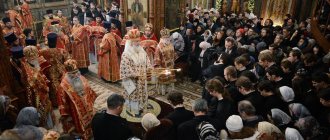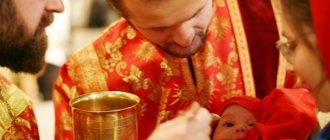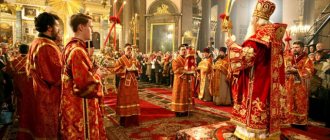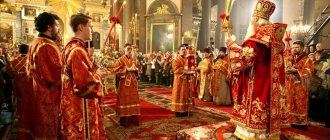"Save me, God!".
Thank you for visiting our website, before you start studying the information, please subscribe to our Orthodox community on Instagram, Lord, Save and Preserve † - https://www.instagram.com/spasi.gospodi/. The community has more than 60,000 subscribers. There are many of us like-minded people and we are growing quickly, we post prayers, sayings of saints, prayer requests, and timely post useful information about holidays and Orthodox events... Subscribe. Guardian Angel to you!
All believers visit the temple from time to time. Some are there to pray, light candles, attend a service, or ask for advice. It happens that we are tormented by some question and it is difficult for us to make a decision on our own. Sometimes there is no one to share a problem with. But after listening to the priest’s sermon and serving the service, we can find the answer to our question and solve the current situation. In order to attend a service, you need to know the time of the service in the church.
Circle of Worship
Divine services are the main purpose of all churches; they are held there daily, and every believer can visit them. Not every person knows what time church services begin, or that there is a daily cycle of services, which includes all three of the above services.
Find out what awaits you today - Horoscope for today for all zodiac signs
There is no general rule, especially on weekdays. Temples are always open early in the morning, so the time of services is most often set by the priest, taking into account the wishes of the people visiting the temple. However, there are some rules that make up the daily cycle of services:
- The morning liturgy, or matins, is held at any time from midnight or 1 am. On Sundays, the time is pushed back to 7-8 am - this is the standard time for Sunday morning services. This early, one might say, night time was not chosen by chance. Not everyone knows that the beginning of a new day is considered not midnight, but 6 pm - this has been the custom since Old Testament times.
- The day's service is mass. May start at 15:00 to 18:00 pm.
- Evening Liturgy, or Vespers. In time it is 19-20 hours.
How is a church service held?
The main service of the day is the Divine Liturgy. During it, they remember not only the worldly life of Christ, but also offer to unite with him during the Sacrament of Communion. In terms of time, it must be done between the 6th and 9th hour before noon. It is also called mass.
The Sunday service in the church is mainly held once and is called the Eucharistic. The morning ceremony is held before her. There is no pause between them, one follows the other.
There are certain changes that have occurred in church life. The main adjustments took place in the Charter. Compline in parish churches is held only during Lent, and the Midnight Office is held only once a year before Easter. Very rarely, a service is also held, which is called the 9th hour. The other 6 services are combined into two groups of three.
In the evening, they spend one after another, first the evening, then the morning and the 1st hour. On the eve of holidays and Sundays, all these services are combined into one and served together, which is called the all-night vigil. In parish churches such services last from 2 to 4 hours, and in monasteries – 3-6 hours.
In the morning, the 3rd, 6th hours and the Divine Liturgy take place alternately. If there are a large number of parishioners in the church, then two liturgies may be held: early and late. Both last about an hour.
On those days when liturgy is prohibited, an image is served. This is the name for a service that includes several chants. But they are not considered to be independent services.
The best article for you, go to: What does the word amen mean in Orthodoxy
According to church rules, divine services also include:
- reading akathists in the temple,
- carrying out all rituals and sacraments,
- reading morning and evening prayers,
- specifying the rules of preparation for Holy Communion.
In addition to holding morning or evening services, as well as hours, special services can be held according to the needs of believers. They are called requirements. This could be: Baptism, Unction, Wedding, Funeral service.
Typically, services are held in churches and only by clergy. Believers take part in them only by reading prayers and singing.
Whether to go to church for services or not is an individual decision for everyone. Many people say that it is better to go to church on weekdays. Fewer people and the priest will be able to devote more time to the parishioners. But for services on Saturday in church, Sunday or a holiday, the number of people increases and does not provide such an opportunity for privacy.
The Lord is always with you!
Morning worship
It is the morning service that is given the greatest attention in the Orthodox Church. For the same reason, the morning liturgy is the longest. This service is dedicated to the life of God on earth, therefore this liturgy includes many prayers - thanksgiving, repentance.
However, the morning service includes several more. For example, the first one starts at 7 am and takes approximately one hour. This is the shortest service. It is dedicated to the moment when the Creator was at the court of the high priest.
Due to numerous requests from readers, we have prepared an “Orthodox Calendar” application for smartphones. Every morning you will receive information about the current day: holidays, fasts, days of remembrance, prayers, parables. Download for free: Orthodox Calendar 2022 (available on Android)
The 3rd hour of the service occurs at approximately 9 am. The main theme is the events in the Upper Room of Zion, the sending of the Holy Spirit to the apostles, the death sentence of Jesus by the praetorian Pilate.
At noon the sixth hour of Matins begins with a mention of the crucifixion of Christ. Finally, at 3 pm - the final service of Matins - 9th hour. It is dedicated directly to the death of Jesus Christ.
Features and types of services
There are 9 services per day in churches, forming a daily circle. They are performed:
- In the evening: 9 o'clock, evening and evening;
- In the morning: Midnight Office, Matins and 1st hour;
- In the afternoon: 3rd hour, 6th hour and Divine Liturgy.
The beginning of this circle is considered to be evening, since this order was borrowed from the Jews, for whom the beginning of a new day occurs at 6 pm, and not at midnight as in Europe. Therefore, the first service is Vespers, during which the Church remembers the history of mankind from the Creation of the world to the Birth of Christ.
A brief summary of the meetings is as follows:
- Vespers is a remembrance of the events of the Old Testament.
- Compline is a public prayer before bedtime during which the descent of Christ into hell is remembered.
- The Midnight Office is a short prayer and reading at midnight as a reminder of the Second Coming and the Last Judgment.
- Matins is a meeting dedicated to the earthly life of Christ with the inclusion of many prayers of thanksgiving and repentance.
- Services of the 1st, 3rd, 6th and 9th hours - short readings and prayers as memories of the condemnation of Christ by the priest Caiaphas, a reminder of the death sentence imposed on the Savior, the time of the crucifixion and death of the Messiah. The 1st hour service begins at approximately 7 am. The last two services are at noon and 3 p.m.
Daily cycle of worship in the Orthodox Church
The main meeting is the Divine Liturgy with Communion, which is celebrated in the pre-dinner time between 12 and 3 o'clock in the afternoon, which is why it is sometimes called mass.
On a note! The frequency depends on the specific temple. So in sparsely populated areas it can be performed once a week, and in megacities - every day. For the same reasons, the order of other services may be changed, so Midnight Office and Compline may be held once a year on the eve of Great Lent and Easter.
Church statutes also consider divine services to be:
- reading akathists;
- conducting rituals and sacraments;
- reading prayers;
- preparation for Holy Communion.
According to the needs and requirements of parishioners, special events can be carried out in the church, which include Baptism, Unction, Wedding, Funeral service. They are also called requirements, i.e. upon request and they are performed according to a specific, separate order, which the priest explains directly during preparation.
Divine Liturgy
Since the most important sacrament of the Church is communion or the breaking of bread, the service at which this sacrament is performed is considered the most important in the Church - this is the Divine Liturgy.
It is performed most often every Sunday, but still depends on the decision of the local diocese, which takes into account the needs of the parishioners and the need for the sacrament. For example, in monasteries the Liturgy takes place every day, since the meaning of monastic life is dedication to God, but in small villages the Liturgy can be performed once a week and during major church holidays.
The main service in the church is the Divine Liturgy
The time of the service also differs and depends on the decision of the clergy, but the service takes place between 7 and 10 am. In large cities, two Liturgies are often held due to the large number of parishioners, so in Moscow in the Holy Trinity Lavra it takes place at 7 and 9 a.m. on Sunday, then on Saturday and on weekdays there is one service at 7 a.m.
During Easter and the Nativity of Christ, liturgies are celebrated at night and during the week - on Wednesday and Friday. At the same time, at night the liturgy takes place immediately after the All-Night Vigil.
The liturgy consists of 3 parts:
- Proskomedia - preparing bread (prosphora) and wine for communion.
- Liturgy of the Catechumens - the deacon serves everyone present in the church, both those baptized and ready for communion, and those who simply came to the church. At this time, the choir sings antiphons, and after that the deacon reads the Apostles and the Gospel.
- Liturgy of the Faithful - only baptized people and those ready for communion are present. During it, the Gifts are moved to the throne, consecrated, and believers approach the priest for communion.
Afterwards the priest blesses the parishioners and ends the service. The time it takes depends on the speed of reading prayers and other factors, but on average the service lasts up to two hours.
Polyele service
In addition to the main major Christian holidays (Christmas, Easter, etc.), there are a number of “medium” ones, which are indicated in red in Orthodox calendars. Usually these are days of martyrs or days of remembrance of some important Christian events. On these days, services are held in a special order and instead of the All-Night Vigil, a polyeleos service is held.
The most solemn part of Matins is the polyeleos.
In this service, Vespers and Matins are performed separately, strictly according to church regulations: in the evening before the holiday and in the morning. The 9th hour is served, and after it the priest begins Vespers with the words “Blessed is our God.” The main difference is the absence of incense and the closed royal doors. During the service, stichera and litia are not sung, and bread is not blessed.
Also, the festive Matins begins with the reading of the royal psalms - 19 and 20, and troparia, and not, as usual, with the Six Psalms, which is read much later on the holiday. Afterwards the service continues as usual.
Evening service
This service includes the 9th hour, Compline and Vespers. The 9th hour is, as already mentioned, the mortal torment of Christ and His death. Therefore, at this time it is very important to pray; this was mentioned in the Apostolic Decrees. It is not without reason that the 9th hour can be added to both mass and vespers. As a rule, it is performed before Vespers, but it is customary to carry it out with the services of the previous day.
Compline is an evening service performed after the evening meal. It is not always performed, but only during the days of Lent, at Christmas and Epiphany. On other days, they get by with Small Compline, including the “Our Father,” psalms, the Great Doxology, and the canon (but not always).
The evening service in the church can be all-day (held on weekdays), small (performed before all-night vigils) and great (one that takes place on holidays or on Sunday). Great Vespers is the most extensive, it includes many prayers, psalms, poems and other things. Small Vespers is a shortened version of the daily Vespers. It is this, together with Great Vespers, Matins and the first hour, that is called the All-Night Vigil.
Are services long in Orthodox churches?
On holidays, even the smallest churches and chapels open their doors to believers. Services, with short breaks, go one after another. They sometimes start very early, before seven in the morning, and end after midnight. There are a lot of people. It is very difficult for an unaccustomed person to spend the whole day in church. Even churchgoers do not always defend all services. But the Byzantine tradition assumed 24-hour service to God, without breaks. For a long time in Rus', the rites of liturgies were preserved, lasting 8-10 hours. Gradually, the readings of prayers, canons and Holy Scripture have been significantly reduced, and now even the longest service does not last longer than three to five hours. After it there is a break, followed by the next one, according to the rule.
Why is worship in a temple necessary?
There are many places in the Bible that mention that a believer should attend Divine services. This is necessary not so much for God as for man himself. God needs nothing; He gives life and breath. The main purpose of the church is to fulfill the great plan of the Creator, that is, to fill everything around with the knowledge of the glory of God. And only if all believers unite, this plan can be realized. In return, Christians receive support, joy, and encouragement—both from God and from each other. Worship services bring people together, they are strengthened by faith in each other. Briefly, the goals of attending Divine services can be called:
- Communication. Moreover, this is a rather specific communication, when all the people present feel like brothers and sisters.
- Prayer, especially communal prayer, is very productive and has enormous power.
- Sermons read in the temple. This is an inexhaustible source of spiritual food for man.
- Singing prayers and psalms, again, is especially common. This is a kind of cleansing.
Today the burning question is: will churches be closed on Christmas?
The coronavirus pandemic is not over, so even in churches people are required to follow the rules - wear masks, keep social distance. At the entrance of some churches, they measure the temperature, accept notes from parishioners “containing sins” and hand them over to the clergy, disinfect icons, crosses, Gospels, and communion spoons after each person, and perform anointing with disposable cotton swabs.
On the eve of Christmas, January 6, traditionally Orthodox Christians in Russia plan to go to churches for solemn services. Since there are many lay people, maintaining social distance is not possible.
Representatives of the Russian Orthodox Church clarified: this is only possible if a state of emergency is introduced.
It is unlikely that the number of lay people participating in divine services will be limited. Earlier, Patriarch Kirill said: due to the pandemic, Russians began to visit churches less often.
Behavior rules
When going to church in general and to Divine services in particular, you should remember that the temple is a special world with its own charter and rules. The norms of behavior there are quite strict, which can somewhat frighten people who have not previously visited this place or have done so very rarely.
- Before attending a service, it is better to refuse to eat, because every church sacrament is performed on an empty stomach.
- The most important thing even when simply visiting church, not to mention worship, is neatness in clothing. This concept should not be confused with high cost from a material point of view. All existing decorations should not attract outside attention. Accuracy and only this is important - this is a kind of tribute to the Lord. And this applies to both women and men. Clothes in light colors are most welcome, except, of course, for mournful events - in this case, only dark ones.
- It is advisable for men to avoid clothing that exposes their limbs - T-shirts and shorts; it is advisable for these parts to be covered. When visiting a temple, it is better for men to avoid bright colors, inscriptions, and holes in clothes. A man's head is always uncovered in church.
- Approximately the same rules apply to women. It is also important that the clothes are not too tight. The woman’s head, on the contrary, is covered - this is also considered a sign of respect for God.
- Before entering, a person must look at the cross located on the door and cross himself three times, accompanying this action with bows. In the vestibule, which is located behind the doors of the temple, you need to do this procedure again, and then you can enter the temple itself.
- You can choose any place for yourself with only one rule: women stand on the left, men on the right. In addition, the main passage should not be blocked. If there are benches, then you need to understand that they are created for those who cannot withstand the service - the disabled, children, the elderly. You need to sit on the bench modestly, not spread out and take up as little space as possible. You cannot stand or sit with your back to the altar. Mobile devices are not allowed, so this must be taken care of in advance.
- There is no need to keep your hands in your pockets, cross them on your chest or behind your back in church. You can’t jostle, talk loudly - in general it’s better to maintain complete silence.
- It is better to come to the service in advance; this time will be spent lighting candles, venerating icons, and submitting notes.
- If there is a small child in the church and the parents cannot get proper behavior from him, then it would be better to remove him so as not to violate the sacrament and not create problems for other parishioners.
- You should not leave the temple before the service ends. It’s not too easy to endure it all, because the evening service in church can take up to 3 hours, but it’s worth being patient. If there are compelling reasons to leave the church before the end of the service, then this should be done as discreetly as possible. The priest will tell you how long this or that sacrament lasts if you ask him in advance.
- Sometimes there is nowhere to place the candle. In this case, you can simply put the candle next to it; it will definitely be placed as soon as there is room in the candlestick.
A lot of questions arise about whether women can attend church on menstrual days. There is no prohibition; it is only recommended, if possible, to refuse to participate in the sacraments, and simply come to pray and light candles.
Not everyone knows where they put which candles, and this is very important. There is no doubt that they are placed before the faces of saints for their health. For candles for the repose there is a memorial table, which is a candlestick with a crucifix. Many people want to submit notes - they are handed over to the ministers, who, in turn, will forward them to the priest.
When leaving the temple, they also cross themselves 3 times, standing facing the facade. All these same rules must be followed when visiting monasteries.
When Patriarch Kirill will read Christmas services on January 7, 2022
The service begins on the night of January 6-7:
- At 23:00 – Repeat of the All-Night Vigil.
- Liturgy of St. John Chrysostom.
- Patriarchal Divine Service.
Jan. 7:
- At 9:00 a liturgy will be held at the Church of the Transfiguration. Christmas carols.
- At 16:00 a Christmas supper will be held in the Cathedral of Christ the Savior.
Church services begin on the night of January 7th. This is due to the fact that Christmas is celebrated after the appearance of the first star in the sky, which is associated with Bethlehem. It was she who announced the coming of Jesus Christ into the world.
Tradition of early Christian worship
Since the first centuries of Christianity, the morning has been considered a favorable time for prayer. A person waking up after a night's rest should turn to God with prayers before starting the coming day. In the history of Christian worship, Matins (prayer in the morning) could begin with the appearance of the first rays of the sun, followed by the liturgy, after which believers partook of the holy mysteries of the body of Christ. On major holidays, the service in the temple took place at night on the eve of the solemn event. The all-night vigil lasted several hours, and at dawn the liturgy began. Nowadays this practice is very rare. Only on Christmas, Easter and Epiphany do services begin at night. On weekdays, Vespers and Matins are held in the evening, and the Liturgy begins the next day in the morning.
